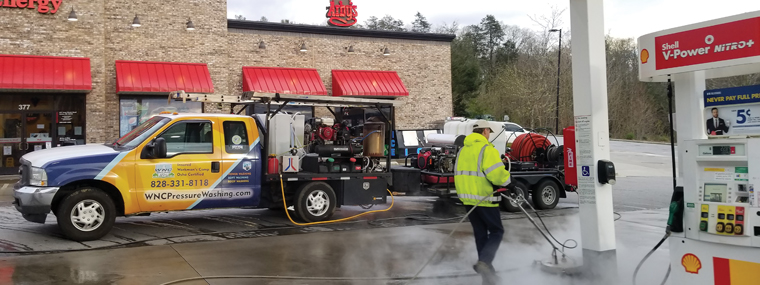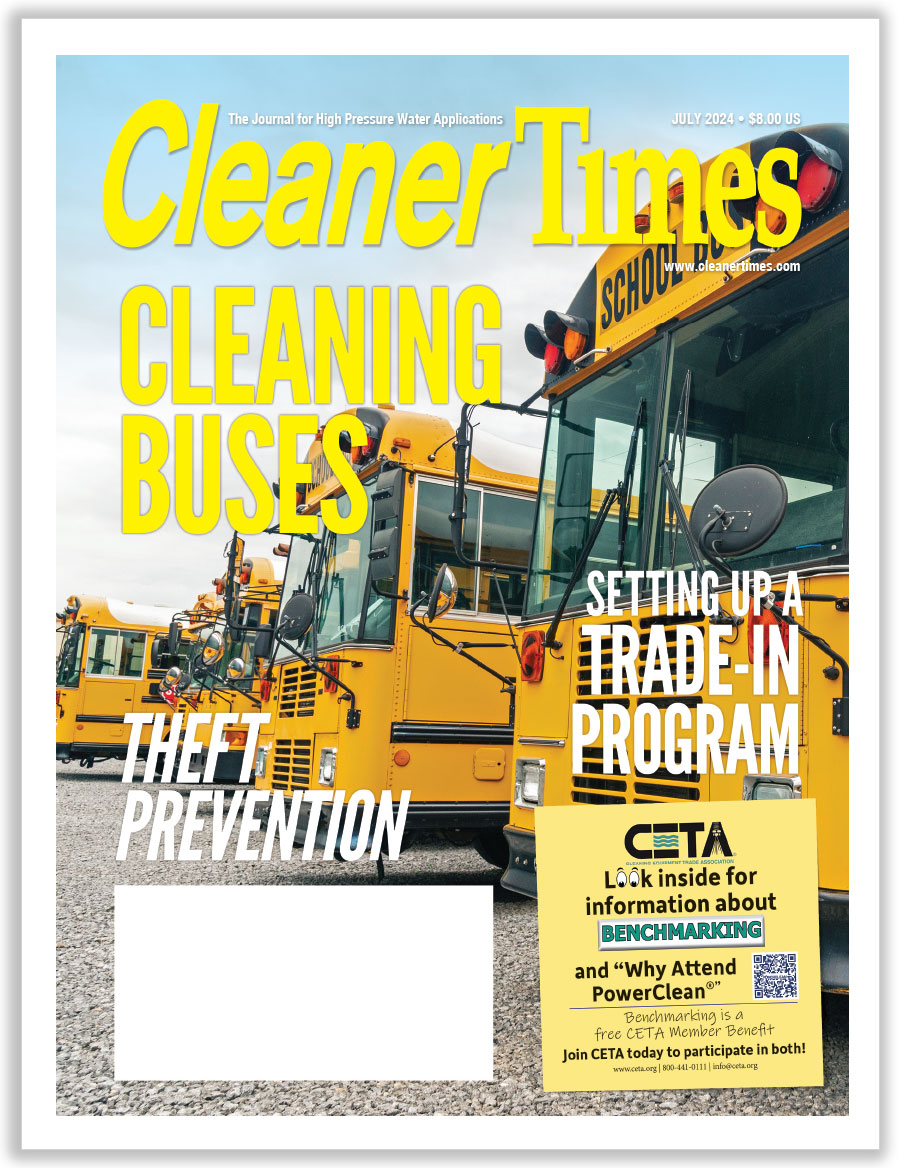
Benefiting from Your Company’s Vehicles
By Diane M. Calabrese / Published July 2021

From camels and oxen to wheelbarrows and covered wagons, people have been determined to find better ways to move around their assorted belongings and tools.
Today’s vehicles offer more options and considerations. A Ford F-150 with a 400-horsepower engine is a long way from camels and covered wagons, but it (and truck models like it) provides an analogous assist as they carry, store, traverse, and sometimes pull.
With the transition well underway to hybrid and electric, trucks may be able to do even more in the future. On-board generators could see contractors through at remote job sites or when there is a power outage. (The vehicles might also usher in the way for large-model cordless-electric pressure washers, if it becomes possible to charge batteries for equipment at the same charging stations that keep trucks moving.)
But what about the present? Vehicle owners should be doing everything they can to make certain they derive every possible benefit from ownership.
 Chris Watson, owner of WNC Pressure Washing and Roof Cleaning based in Waynesville, NC, shares some of his experience with vehicle use. “We use a Ford pickup that has been converted into a flatbed,” he explains.
Chris Watson, owner of WNC Pressure Washing and Roof Cleaning based in Waynesville, NC, shares some of his experience with vehicle use. “We use a Ford pickup that has been converted into a flatbed,” he explains.
“On our flatbed we have a four-gpm pressure washer with standup burner and an AODD [air-operated double-diaphragm] pump and air compressor for our soft-washing setup,” says Watson. “This setup allows us to have everything we need at our disposal.”
Watson is considering options regarding a new vehicle. “Currently we are looking to purchase a Ford F-150,” he says. “Our next step, once we purchase the vehicle, is to have a soft-washing skid dropped in the truck.”
The soft-washing skid no longer needs be a custom-build option for contractors. Distributors and manufacturers have kept pace with the increase in soft washing by offering choices in preconfigured skids.
Being able to carry a skid that consolidates and deftly arranges pressure washer, water tank, chemical tank, soap tank, freshwater pump, etc. simplifies access and speeds work at jobsites. A six-foot or eight-foot truck bed makes it possible to select from ready-made skids. Whether custom or pre-configured and sized, being able to carry the skid affords a big benefit to the vehicle owner.
Wherever company vehicles go, they can send a message. And Watson uses the exterior surface to do that. “We have our truck fully wrapped,” says Watson. “The most obvious reason we love having our truck wrapped is the driving billboard aspect. During our initial phone conversation with a future customer, we ask how they heard about our company, and roughly three in twenty say they saw our truck in town.”
Watson explains he has long had an appreciation of advertising on vehicles. “I have always loved a wrapped vehicle; to me it shows the company is professional and takes this profession seriously.”
For the many benefits of vehicles to be realized, vehicles must be kept in optimal condition. Watson tells us how he does just that. “We have a full-time mechanic for the vehicle,” says Watson. “For the equipment, we take everything to a local small-engine repair shop every quarter for basic upkeep and maintenance. We keep spare parts on hand to switch out when needed during times we can’t get to a mechanic.”
 Getting the maximum benefit from vehicles encompasses both proper maintenance and prudent replacement. Investment in vehicle replacement can be made in an informed way by using a vehicle-replacement cycle guide of some sort. Vehicle manufacturers and researchers at universities produce guides, or owners can develop their own guides.
Getting the maximum benefit from vehicles encompasses both proper maintenance and prudent replacement. Investment in vehicle replacement can be made in an informed way by using a vehicle-replacement cycle guide of some sort. Vehicle manufacturers and researchers at universities produce guides, or owners can develop their own guides.
By consistently using a spreadsheet to record maintenance, cost of maintenance, parts, cost of parts, fuel—along with dates of payment/purchase for each vehicle—an owner gets a clear view across time about how it’s doing. At some juncture, payments for a new vehicle may be less than the cost of maintaining one it will replace.
New vehicles typically provide greater fuel efficiency—a nice benefit. There are also safety improvements and emissions reductions built into every iteration (model year).
The need contractors have for vehicles is obvious. To get to job sites, carry equipment and transport team members, or pull a trailer, there is no alternative to using a vehicle. Public transit will not work.
Manufacturers and distributors have more options regarding vehicles. Manufacturers can use transport and shipping companies. Distributors can do the same. If trips must be made to customer sites, both manufacturers and distributors can make them in private vehicles. (Following relevant Internal Revenue Service guidance, private vehicle drivers can get reimbursed for use of a personal car for business or claim the expense when filing taxes.)
Is it beneficial to a distributor or manufacturer to own vehicles? That’s a question a company owner must answer in conjunction with advice from an attorney and an accountant. (For instance, if an employee uses an employer-owned vehicle under certain circumstances, the employee may incur taxes because of the arrangement.)
Some distributors make deliveries within a certain radius of their facility. They then use common carriers for large items and familiar shipping firms for smaller ones. Having a company vehicle available for deliveries can be important in an emergency, such as when a loyal customer requires a part immediately—and needs it in the field.
To obtain the most benefit from vehicles, a company generally must meet the following criteria: The vehicle is essential to the function of the company every day (e.g., contractors). The vehicle will not become a liability (e.g., drivers can be relied on never to divert the vehicle from its business function). Vehicle need is sufficiently frequent that it could not be met economically with alternatives (rentals, carriers, reimbursement to team members for using a personal vehicle).
Focus on the Plusses
A company’s vehicles should be tools (like any other) for boosting the bottom line. Just as a manufacturer or distributor might do better owning no vehicles, a contractor may do better reducing the number of vehicles owned.
Larger contractors can benefit from having more than one kind of vehicle on their roster. They might have three pickups, trailers, and one box truck or van. The box truck or van can be used by a manager who checks setups and monitors sites and who can ferry parts and chemicals to team members at job sites.
 The manager’s truck can also carry a spare pressure washer or other spare equipment. It’s a great benefit when one person can quickly travel to a job site, switch out a machine that’s not working, and take the machine to a service center.
The manager’s truck can also carry a spare pressure washer or other spare equipment. It’s a great benefit when one person can quickly travel to a job site, switch out a machine that’s not working, and take the machine to a service center.
Vehicles that can carry water tanks to job sites—either onboard or via a trailer—can also be a great benefit to contractors. Prospective customers often seek contractors who can carry water to the jobsite, not because of the cost of water but because they have unpredictable pressure and other water pipe issues. Basically, they want the contractor to be self-contained.
A vehicle with everything required to complete the job, including water and power generator, benefits the contractor by denoting professionalism. Customers are purchasing a service, and they expect the service provider to have everything they require to get the job done.
When several vehicles are owned by a company—whether contractor, distributor, or manufacturer—routing them to their destinations to minimize travel yields benefits. Not only are fewer miles covered, which reduces fuel costs and lowers driving risks, but work sites or delivery addresses are reached in less time. The less time spent in transit, the more time available to complete work.
Vehicles depreciate, and claiming allowable depreciation can reduce the tax burden. Get the most up-to-date advice on record keeping for depreciation, which can be a significant benefit, from an accountant.
By using tracking devices on its vehicles, a company can benefit from information about everything from errant driving to drivers that take circuitous routes. The key is to have policies in place that clarify both are unacceptable. With the data from monitoring systems, a company can cite departure from company policies and either dismiss or retrain an employee.
 If a company wants employees to drive a certain kind of vehicle or a vehicle with specialized features (e.g., four doors or sedan to accommodate passengers, such as visiting vendors), it is usually a benefit to own the vehicle. In the same context, a company has more control over the image projected by its vehicles when it owns them.
If a company wants employees to drive a certain kind of vehicle or a vehicle with specialized features (e.g., four doors or sedan to accommodate passengers, such as visiting vendors), it is usually a benefit to own the vehicle. In the same context, a company has more control over the image projected by its vehicles when it owns them.
A company vehicle that is clean and well-maintained reflects favorably on the company. If it is a car, it can be fitted with a modest (not oversized) logo or company name on the doors.
The perceptions of prospective customers often hinge on the smallest things. An estimator for a contractor who arrives in a clean car with a clean dashboard and nothing hanging from the rearview mirror speaks to efficiency and seriousness of purpose. The same is true for a distributor or manufacturer who travels to a customer site to advise on a custom design.
One of the biggest benefits that derives from a company vehicle is the good first impression it can make. Exploit it.






